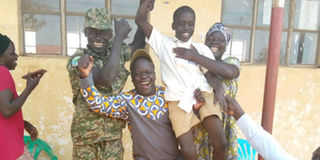Less than 5 percent of special needs pupils got first grade

Bona Oreste, who scored Aggregate 7 from Apo Army Special Needs Education in Yumbe District, celebrates with his family.
What you need to know:
This has been blamed on the lack of equipment for learners
Only 121 (4.6 percent) out of the total 2,606 Special Needs Education (SNE) pupils who sat the 2023 Primary Leaving Examination (PLE), passed in first grade.
Of the 121 pupils, 70 are partially blind, 49 have dyslexia and two (one blind and one physically handicapped) need transcribers.
This was revealed during the release of the results by the Uganda National Examinations Board (Uneb) in Kampala yesterday.
A total of 413 pupils with dyslexia, 285 with partial blindness, 40 who are deaf, 23 blind and 16 who are physically handicapped passed in second grade.
At least 208 pupils including 81 partially blind, 119 deaf, and eight with dyslexia and those needing transcribers failed the exams.
The rest passed in third and fourth grade.
The Uneb board chairperson, Prof Celestino Obua, attributed the high failure rate to the lack of equipment and personnel needed by the learners.
“Categories of SNE candidates require specialists on a one-on-one basis throughout the examination period. These are the deaf who need sign language interpreters and the physically handicapped and dyslexics who require transcribers,” he said.
He added that the Board has taken an interest in the candidates who are ungraded (Division U).
“Management has been asked to carry out a detailed analysis covering the last five years to establish if there is a trend in terms of districts and schools. Of particular interest will be those districts where over 20 percent of the candidates are in Division U,” he said.
The Uneb executive director, Mr Dan Odongo, said they have managed to help the dyslexia pupils and the partially blind candidates, which has helped them perform better.
Mr Odongo said 995 candidates needed specialised assistance such as the provision of braille, sign language interpreters, transcribers, and physical support (amanuensis).
A total of 46 out of the 2,652 SNE learners who were registered for the exams, did not turn up which Mr Obua said they are going to investigate.
The Minister of Education and Sports, Ms Janet Museveni, said her ministry will support the SNE learners.
“In my view, the number of SNE learners who sit PLE is increasing not because we are having more children with disabilities, but the sensitisation being done and realisation by more parents that these children must not be kept at home but sent to school,” she said.
“We shall study further this area of assessment and examination of SNE learners and see what feasible interventions we need to make in a manageable manner without compromising the quality of education this category of learners accesses and attains,” she added.
Boys versus girls
In terms of gender, 1,261 (47.5 percent) of the registered candidates were females and 1,391 (52.5 percent) were males
There was however an 8.7 percent increase in the number SNE learners who were registered as compared to 2,436 in 2022.




